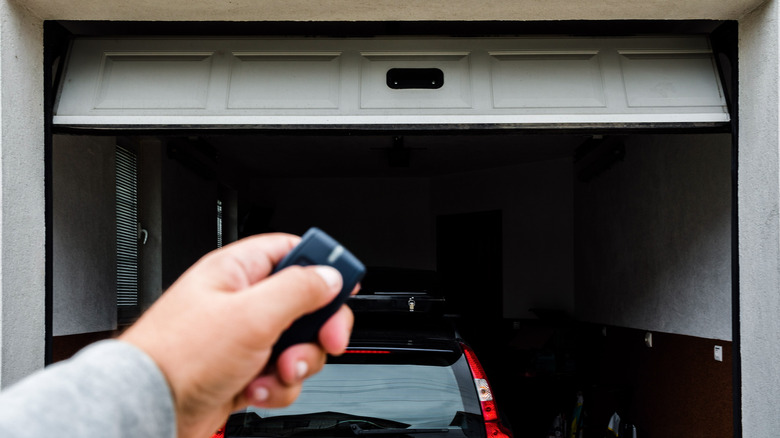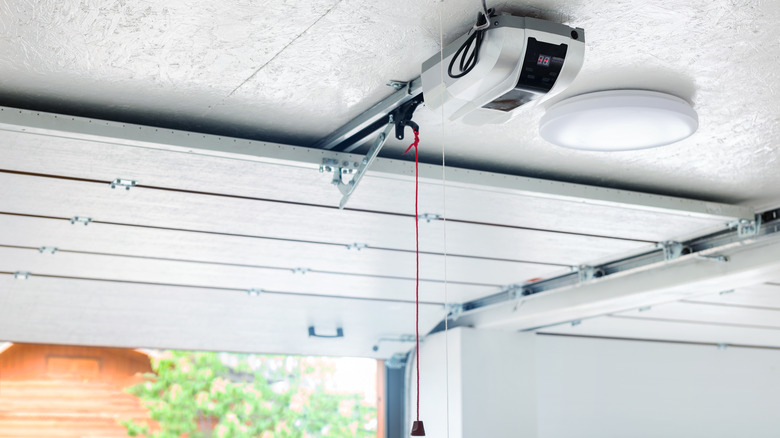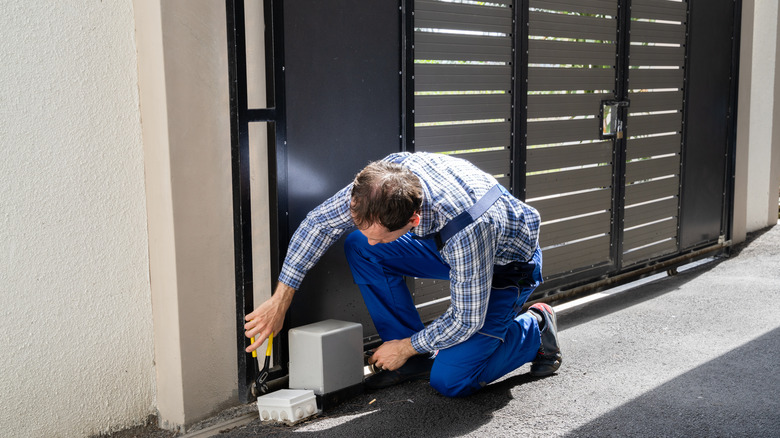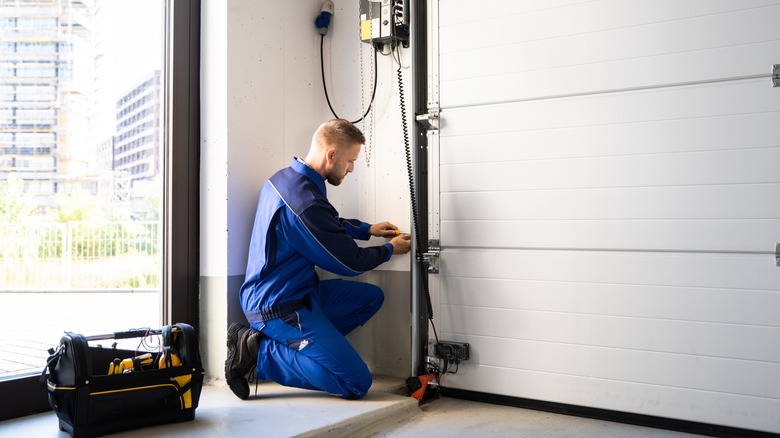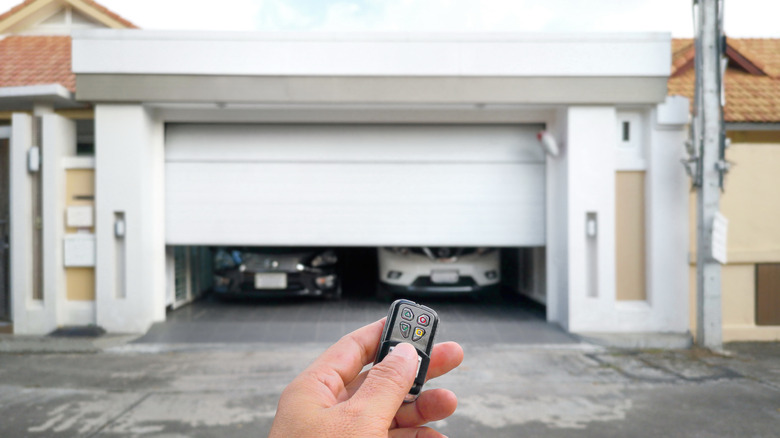5 Reasons Why Your Garage Door Isn't Closing
The garage is a valuable space in our homes for various reasons. For most homeowners, the garage serves the traditional role of keeping vehicles safe; for others, it can be anything from providing extra storage to serving as a studio for creatives. Regardless of what you use your garage for, you need it to be fully functional for safety and privacy purposes. So what does it mean when the garage door fails to close?
Well, a garage door may fail to close for reasons spanning from dead batteries to misaligned tracks, and you should be concerned since the security of your home is compromised. Whenever this happens, you should take it as a sign that your garage door might need some maintenance or repair work. Fixr details that garage door repair costs an average of $150 and $350. However, it is also worth mentioning that not every problem warrants a repair; some issues are easy to isolate and fix. Let's look at some of the reasons why your garage door isn't closing and how you can identify and probably fix them.
1. The transmitter batteries could be dead
The garage opener is one of the gadgets we use daily but is often taken for granted. This device runs on a pretty old-school technology: the radio system transmission. The hand-operated device is a radio transmitter, and a radio receiver is built into the garage door opener. Radio transmission is sent to the garage door opener with the press of a key, and the door either opens or closes, depending on the need, via Quality Overhead Door. Understanding that the transmitter on the handheld device and the receiver on the door opener need to communicate makes it easy to know where the problem could be.
The transmitter needs batteries to send signals to the receiver on the door opener. When the batteries have no juice, there is no signal sent, and the door fails to close or open, for that matter. For a regular homeowner, it is not obvious whether the transmitter has run out of juice or not; therefore, it is advisable to call a technician to have a look at the problem and replace the batteries on your behalf. However, if you are pretty sure that the transmitter batteries are dead, you can replace the batteries by yourself.
2. The photo eye is not aligned
From the year 1993, the US government required every residential garage door opener to be fitted with a photoelectric reversal system, details Regional Doors & Hardware. This device features two tiny photoelectric sensors installed about 6 inches from the bottom of the garage door. Because of the daily use of the garage door, it is pretty easy for the photo eye sensors to be misaligned. So if your door is not closing, chances are the photo eye sensor might have shifted out of alignment, or there is an obstruction on one of the eyes.
In the event of an obstruction, you must wipe off the debris with a clean cloth. However, if the sensors are out of alignment, they need readjusting. But how do you know if the sensors are misaligned in the first place? According to The Door House, each sensor is fitted with an LED light indicator that should be lit consistently and constantly. So if you notice that the light is flickering or is not lit, it could be because of misaligned sensors. Realigning the sensors is better left to trained hands; you don't want to risk causing more damage to your door, especially if you don't have any prior experience.
3. Broken or misaligned tracks
The garage door needs to run on tracks to facilitate opening and closing. So if the garage tracker is out of place or has damage, the door will not close past the point of damage. According to Precision Door of Fresno, garage door track problems are caused by three primary reasons: wear and tear due to aging, insufficient lubrication, and chemical damage. The very first tell-tale signs that you might be having a problem with the tracker is if you notice bumps and bends on the rail or gaps between the tracker and rollers. The garage door is also quite heavy and will worsen the problem significantly when left unattended.
Usually, if the tracker is misaligned or has damage, the garage door often moves up to a certain point. The door might stop, slow down, or make weird sounds as it struggles to get past the tricky spots. This problem, too, needs trained hands to realign the trackers back to position. Usually, the technician will have to use specialized equipment to return the tracker and ensure it is perfectly straight. Also, only the professional will be able to determine if the tracker is broken beyond repair and needs to be reinstalled.
4. Your springs are broken
A garage door can only have one of the two types of springs available, torsion and extension springs. According to Garage Door Medics, torsion springs are common for modern options and are typically installed horizontally over the garage door. Extension springs, on the other hand, are installed parallel to the door tracks on either side of the door. Contrary to what most people think, the springs are what do the heavy lifting and not the door opener. So if the springs are broken, there is no way the garage door is coming up.
If you are at home when the springs break, you will definitely know. You won't miss the loud bang that can easily be mistaken for a firecracker going off in the garage. Many garage doors have either one or two springs; in the event of a break in either spring, the door might struggle to open or even fail to open completely. If this is the case, you need to call professionals to help you fix the problem. It is quite dangerous to try and fix it by yourself since the garage door is quite heavy and can cause injuries.
5. Transmission problems
The garage door transmission might be why the door is not closing or even opening. While there are many reasons for this problem, sometimes you might just be out of range. Whenever you need to open or even close the garage door, you should be within a specific radius for your remote controller opener to communicate with the receiver and respond appropriately. According to Appliance Analysts, the typical range for most garage doors is about 50 feet. So you will have more success opening or closing the garage door if you are within range.
However, sometimes you are within range, but the door won't open or even close. In such a scenario, ensure the antenna is placed correctly, and there is no obstruction to the signal. Another possible cause of transmission problems is when your neighbor uses the same frequency as yours. In such a scenario, you will have to call the professionals to handle the situation. It is possible to change the frequencies depending on the specific model. It should be a simple fix, and your garage door should return to regular operation immediately.
